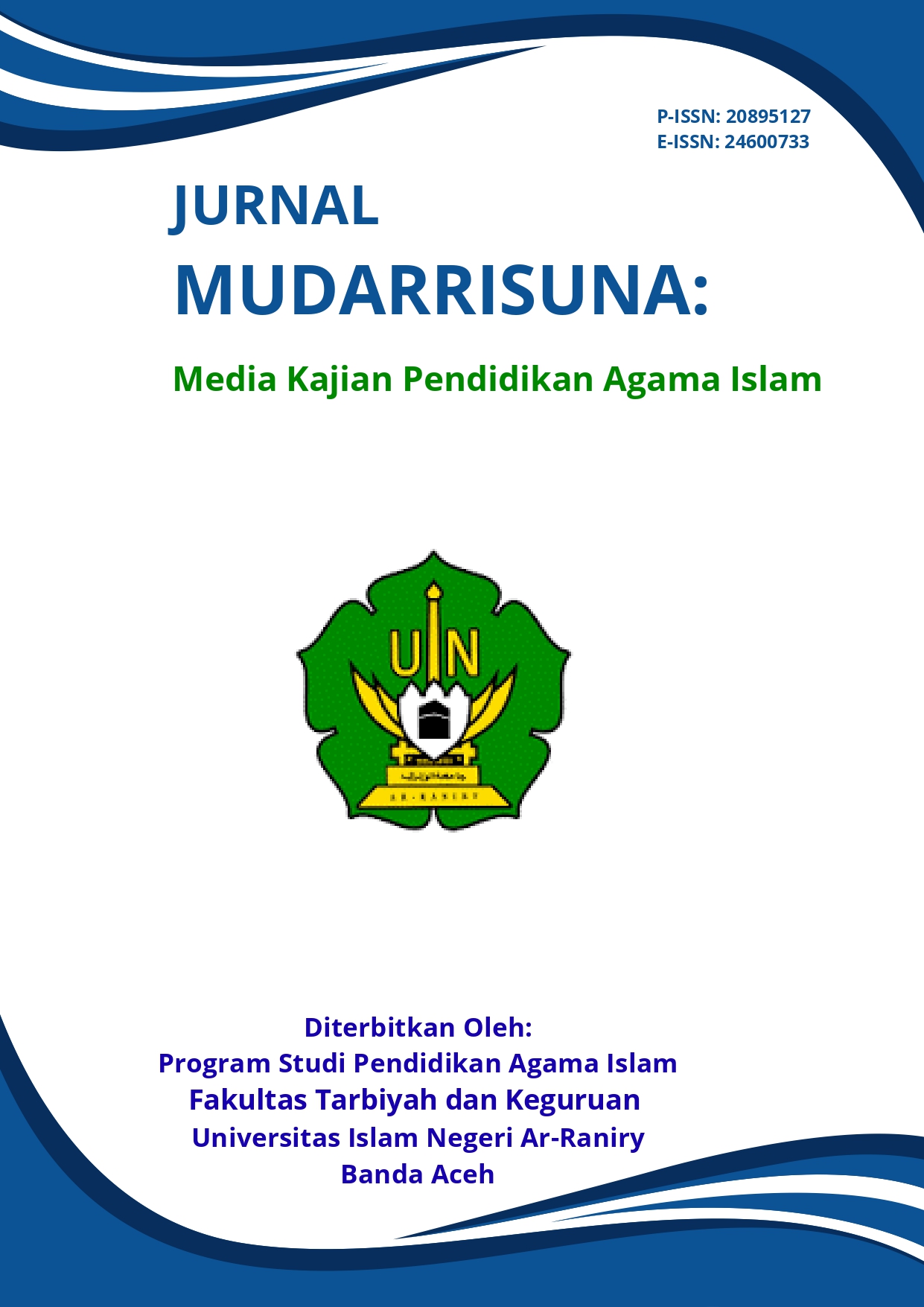PENGARUH EKSTRAKURIKULER ROHANI ISLAM (ROHIS) DAN MOTIVASI BELAJAR TERHADAP HASIL BELAJAR PAI (STUDI DI SMP NEGERI SUNGAI PENUH PADANG
DOI:
https://doi.org/10.22373/m64ak956Keywords:
Rohis Extracurricular, Motivation, Learning Results.Abstract
This research examines Rohis' extracurricular activities and learning motivation as support in the learning process which influences PAI learning outcomes. The sample in this study was 301 students at SMPN Sungai Banyak. The method used is quantitative and data collection techniques use questionnaires. This research reveals how much influence Rohis extracurriculars and learning motivation have on PAI learning outcomes by analyzing the results of student questionnaires. The results of this research show that Rohis' extracurricular contribution influences learning outcomes by 13.4%, and learning motivation influences learning outcomes by 39.8%, and Rohis extracurriculars and learning motivation influence learning outcomes together by 41.4%.
Keyword: Rohis Extracurricular, Motivation, Learning Results.
References
Abdullah, M., Muflih, F., Zumroti, L., & Muvid, M. B. (2019). Pendidikan Islam. Aswaja Pressindo.
Abdurrahman, A., Nelly, Andriyani, V. S., Arsiwie, S. R., Aimi, & Aryanti, N. (2024). Teori Pembelajaran. PT Sonpedia Publishing Indonesia.
Agung, F. (2017). Efektivitas Kegiatan Ekstrakurikuler Keagamaan (Rohis) dalam Meningkatkan Hasil Belajar PAI pada Sswa di SMP Wiyatama Bandar Lampung. Jurnal Pendidikan Agama Islam.
Bahri Dramarah, S. (2002). Psikologi Belajar. Kencana.
Djaali. (2007). Psikologi Pendidikan. Bumi Aksara.
Hamalik, O. (2003). Prosedur Belajar Mengajar. Bumi Aksara.
Hamid, H., & Ahmad, B. (2013). Pendidikan Karakter Perspektif Islam. CV PUSTAKA SETIA.
Nurdin, N. (2018). Pedoman Pembinaan Rohis Di Sekolah dan Madrasah. Erlangga Gruup.
Nursyamsi. (2003). Psikologi Pendidikan. Perpustakaan Nasional.
Octavia, S. A. (2020). Motivasi Belajar Dalam Perkembangan Remaja. CV BUDI UTAMA.
Peraturan Menteri Pendidikan dan Kebudayaan Republik Indonesia Tentang Kegiatan Ektrakurikuler Pada Pendidikan Dasar dan Pendidikan Menengah. (2014).
Pramusinta, Y., & Nur Faizah, S. (2022). Belajar dan Pembelajaran Abad 21 Sekolah Dasar. Nawa Litera Publishing.
Purnama, S. (2016). Pengaruh Motivasi Belajar Terhadap Prestasi Belajar Mata Pelajaran Pendidikan Agama Islam Siswa Kelas VIII SMP Bani Tamim Tahun Ajaran 2014/2015. Universitas Islam Indonesia.
Sardiman. (2001). Interaksi dan Motivasi Belajar Mengajar. PT Raja Grafindo Persada.
Septapendra, R., Busmiadi, & Trisna, Y. (2023). Wawancara.
Sudjana, N. (2007). Penilaian Hasil Proses Belajar Mengajar. PT Remaja Rosdakarya.
Sugiono. (2022). Metode Penelitian Kuantitatif, Kualitatif dan R&D. ALFABETA CV.
sukardi. (2022). Evaluasi Program Pendidikan dan Pelatihan. Bumi Aksara.
Suryabrata, S. (1984). Psikologi Pendidikan. Rajawali.
Syarifuddin. (2018). Ektrakurikuler Pendidikan Agama Islam. CV BUDI UTAMA.
Downloads
Published
Issue
Section
License
Copyright (c) 2025 deni - saflidarti

This work is licensed under a Creative Commons Attribution-ShareAlike 4.0 International License.
Jurnal MUDARRISUNA: Media Kajian Pendidikan Agama Islam allows the author(s) to hold the copyright and to retain the publishing rights without restrictions. Authors who publish in this journal agree to the following terms:
- Authors retain copyright and grant the journal right of first publication with the work simultaneously licensed under a Creative Commons Attribution-ShareAlike 4.0 International License that allows others to share the work with an acknowledgment of the work's authorship and initial publication in this journal.
- Authors are able to enter into separate, additional contractual arrangements for the non-exclusive distribution of the journal's published version of the work (e.g., post it to an institutional repository or publish it in a book), with an acknowledgment of its initial publication in this journal.
- Authors are permitted and encouraged to post their work online (e.g., in institutional repositories or on their website) prior to and during the submission process, as it can lead to productive exchanges, as well as earlier and greater citation of published work.




